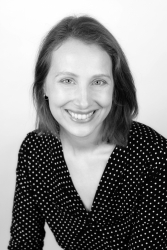Roads Taken and Not Taken: Anya Krugovoy Silver '90

Details
I was always a timid child, the one who wanted recess to be over sooner so that I could avoid the jostling, sometimes cruel hierarchies of the playground. When I arrived at Haverford in the fall of 1986, I felt, once again, overwhelmed by my new peers, all of whom were seemingly more comfortable and confident than I was in this new environment of customs groups, alcohol and coed bathrooms.
In the classroom, though, I felt at home, both socially safe and intellectually challenged. When my freshman English professor, Debora Sherman, drew a bird on the board and wrote“soul” next to it, I was smitten with the pleasures of symbol and language. The next year, when Professor Stephen Finley introduced me to John Ruskin and William Morris, I was able to think about the pursuits of beauty and literature in moral terms, of art as a fundamental necessity for all human beings and, at its best, a form of service. I knew that I wanted to write poetry, and I had come to a place where this calling was taken seriously. In his poetry writing seminars, Professor Finley urged students both to hone a craft and, though he didn't use the word explicitly, to explore the“soul” of human experiences, both our own and others'.
With my Haverford professors as models for the kind of life that I wanted to live, I took a well-defined road after graduation. After graduate school in English literature at Emory University, I had the good fortune to get a tenure-track job with my husband at Mercer University, in Macon, Ga. I continued to write, and my career trajectory seemed secure.
Then, in 2004, while I was pregnant with my son, I was diagnosed with Stage III inflammatory breast cancer. IBC is the most aggressive and lethal form of breast cancer. Statistics for long-term survival are grim. I was accustomed to discussing the“journey of life” in the poetry classroom: in Robert Frost's "The Road Not Taken," or Constantine Cavafy's "Ithaca." Cancer changes that journey fundamentally and forever. It's a road that I would never have chosen to take. I could cope with the baldness and exhaustion, the paradox of nurturing life while fighting for my own. What really terrified me was the strong possibility that I would die soon, before I had accomplished what I meant to, and before my son was old enough to remember me.
One way that I responded to cancer was to write. Cancer became what Emily Dickinson calls my "flood subject." I wrote and wrote and wrote. Writing about cancer gave shape to the hazards of illness. It helped me control my response to fear, and to explore the metaphysical questions that suffering raises. Poetry enabled me to share the experience of being seriously ill with a world that often does not want to see cancer beyond pink ribbons and survival. It helped me communicate with my sisters and brothers in disease. Oddly, this terrible road resulted in my becoming the poet that, at Haverford, I wanted to be. I found my subject; I found my vocation. We don't always get to choose our roads.
When my first book of poetry, The Ninety-Third Name of God, was published in 2010, I had just suffered a recurrence of breast cancer in my sternum. My cancer is now metastatic, which means that it is considered treatable but not curable. I hope to live and write for many more years, but I know that my life might well be over in a year, maybe two. How do I cope with this reality? I do what I learned to do at Haverford: I teach, hoping to instill in my students the transformative love of the written word and the search for beauty and truth that makes us human. And I write. My life is deeply satisfying and happy. Every day with my husband and child is miraculous. I accept the road that I am on. And, every year, I draw a bird on the chalkboard and write“soul” next to it.



